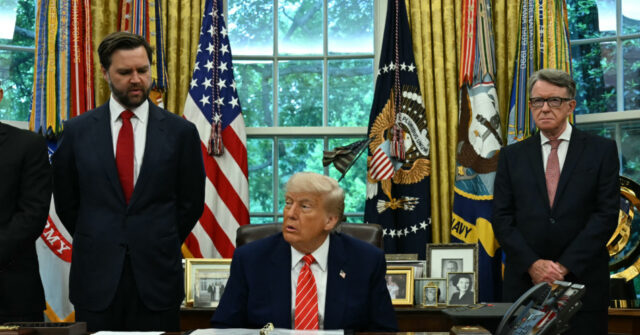Trump Celebrates Landmark Trade Agreement with the UK: What It Means for the Future
Former U.S. President Donald Trump announced a historic trade agreement with the United Kingdom on [current date], marking a pivotal shift in transatlantic economic relations. The deal, negotiated during Trump’s post-presidency, aims to reduce tariffs, streamline regulations, and boost bilateral trade. Experts suggest it could reshape industries from agriculture to technology, though critics warn of potential downsides for workers and consumers.
The Key Components of the Trade Deal
The agreement, dubbed the “U.S.-UK Prosperity Pact,” focuses on several critical areas:
- Tariff Reductions: Immediate elimination of tariffs on over 90% of goods, including automobiles, pharmaceuticals, and agricultural products.
- Regulatory Alignment: Simplified standards for industries like fintech and medical devices to expedite cross-border commerce.
- Digital Trade: Provisions to facilitate data flows and e-commerce, addressing longstanding barriers for tech firms.
- Investment Protections: Enhanced safeguards for businesses operating in both markets, reducing legal uncertainties.
According to preliminary estimates, the deal could increase bilateral trade by up to $30 billion annually within five years. “This is a win-win for both economies,” Trump declared during a press conference. “We’re cutting red tape and putting American and British workers first.”
Economic Implications for the U.S. and UK
The agreement arrives at a critical juncture for both nations. The UK, still navigating post-Brexit trade dynamics, gains a powerful ally to offset EU market losses. Meanwhile, the U.S. secures preferential access to the UK’s $3.1 trillion economy, its seventh-largest trading partner.
Dr. Eleanor Whitmore, a trade economist at the London School of Economics, noted, “This deal could bolster the UK’s GDP by 1.2% by 2030, particularly in manufacturing and services. However, smaller farmers may struggle to compete with subsidized U.S. agricultural imports.”
In the U.S., industries like aerospace and whiskey stand to benefit. Kentucky bourbon producers, for instance, could see a 25% surge in exports to the UK, where tariffs previously reached 10%. Conversely, some U.S. labor groups fear job losses in sectors vulnerable to cheaper UK imports, such as ceramics and textiles.
Political Reactions and Controversies
The deal has sparked mixed reactions. Supporters, including conservative lawmakers and business lobbies, praise its potential to drive growth. “This is the kind of bold leadership we need,” said Rep. Kevin Brady (R-TX), former House Ways and Means Chair. “It opens doors for small businesses and strengthens our geopolitical ties.”
Critics, however, question its timing and transparency. “Negotiations lacked public input, and the environmental provisions are weak,” argued Sen. Elizabeth Warren (D-MA). Labor unions also warn of a “race to the bottom” in wages if corporations exploit looser labor standards.
Long-Term Prospects and Global Impact
Analysts suggest the deal could influence other trade negotiations, including the UK’s ongoing talks with India and the U.S.’s Indo-Pacific framework. “This sets a precedent for ‘America First’ deals post-Trump,” said geopolitical strategist Ian Bremmer. “It may pressure the EU to rethink its own U.S. trade strategy.”
Looking ahead, key questions remain:
- Will the agreement survive potential political shifts in either country?
- How will it affect supply chains reshaped by recent global crises?
- Could it deepen economic disparities within certain sectors?
For now, businesses on both sides are scrambling to adapt. “We’re reviewing the fine print to capitalize on new opportunities,” said a spokesperson for Jaguar Land Rover, a UK automaker heavily reliant on U.S. sales.
What’s Next for U.S.-UK Trade Relations?
Implementation begins in early 2025, pending legislative approvals. Observers recommend stakeholders:
- Monitor regulatory updates to avoid compliance pitfalls.
- Invest in workforce training to leverage emerging sectors.
- Engage policymakers to address unresolved issues like digital taxation.
As the world watches, this deal could redefine transatlantic trade for decades. To stay informed on its progress, subscribe to our trade policy newsletter for expert analysis and breaking updates.
See more Business Focus Insider Team

